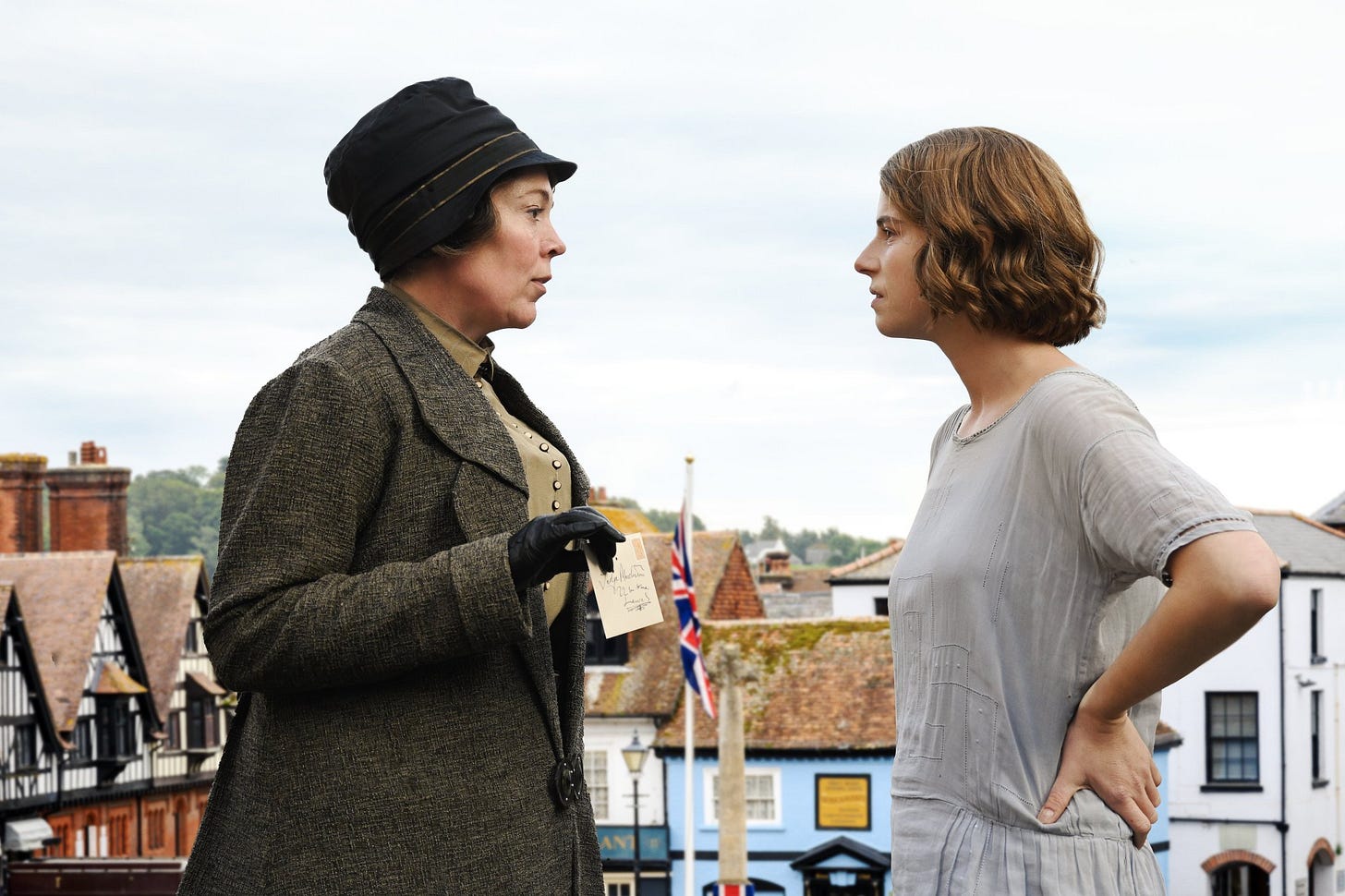Wicked Little Letters
Olivia Colman and Jessie Buckley make for a zesty pair of antagonists in this (mostly) true tale of a poison pen letter scandal in 1920s England.
“Wicked Little Letters” is one of those stories that sounds like it surely must be made up but is actually based on historical fact — “This is more true than you think” is the film’s coy preamble.
The seaside town of Littlehampton, England, in the 1920s was briefly transfixed by a scandal of poison pen letters assaulting the senses of the neighborhood. They were filled with all sorts of the vilest (for its time) insults and epithets, angry but almost poetic. Initially directed at a single modest spinster, it eventually spread to many prominent members of the community and even became an issue at the highest levels of British government.
Oscar winner Olivia Colman and Oscar nominee Jessie Buckley make for a pair of zesty antagonists as the innocent Christian woman targeted by the letters and the crass, Irish immigrant neighbor suspected of being the perpetrator, respectively.
It’s a thoroughly entertaining and humorous black comedy with plenty of great one-liners and hilarious shtick. But the movie also has some deeper observational notes about the vulgarization of our discourse, and how women were (and are) the chief victims of nasty invective.
And often prime perpetrators too, it should be said.
The story opens not with the first letter but the 19th. Edith Swan (Colman) is an upstanding woman who still lives with her parents (Timothy Spall and Gemma Jones) at an advanced age. (Probably about 35, practically ancient for that time.) They are good working-class Christian folk, of the variety that’s as much about judging others as acknowledging their own sins, waiting patiently if not quite meekly to inherit the earth.
“Prideful humility” is the type, if you know what I mean.
Her dad is very protective of Edith, but also keeps her pretty tightly under his thumb, so the shocking letters addressed to his daughter vex him to no end. They immediately suspect next-door neighbor Rose Gooding (Buckley), who drinks and carouses and swears like a sailor on shore leave despite having a young daughter, Nancy (Alisha Weir).
The police are brought in, led by a bumbling young inspector (Hugh Skinner) who moves straight from fact-gathering to arresting Rose based on Mr. Swan’s cajoling. The real brains on the force is Woman Police Officer Gladys Moss (Anjana Vasan) — her gender is part of her title — who deduces that Rose has been set up.
She gets pushback from her commander, who thinks Gladys should be content as window dressing. “Women officers don’t sleuth, love.”
I’ll pause her to note that “Letters” is set in a fanciful version of 1920s England where people of all sorts of ethnicities and socioeconomic status mingle freely and without any sort of friction or racism. So there’s a Tamil constable and Black postal workers and even judges. Rose’s boyfriend, Bill (Malachi Kirby), raises no eyebrows from the Swans for his dark complexion, which is a pretty unthinkable scenario for that time and place.
My take on this is it’s nice to watch movies where racial diversity is healthy. But it does create a disconnect from realism when we depict homogenous societies as ahistorically idealized.
Director Thea Sharrock (“Me Before You”) and screenwriter Jonny Sweet, in his first feature film script, keep things light and playful while letting the deeper message gradually soak in. The menfolk are the background players, and the real tale is about how women are nudged by our culture to scratch at each other, internalizing patriarchal mores and doing the dirty work for them.
The odd truth is that Edith and Rose genuinely like each other, and in other circumstances would probably have become good friends. Edith professes to be shocked by Rose’s coarse manners but not-so-secretly admires her independent spunk. Rose has had enough bootheels on her own neck to recognize Edith as someone who’s adapted to her soft subjugation.
Buckley has the showier role as the wild child Rose, enthusiastically hurling f-bombs and butting heads with her critics (sometimes literally) in a full-throated celebration of womanhood unbowed. Only when she’s faced with the prospect of being separated from Nancy by serious prison time does she begin to consider toning it down a bit. But her cheeky side is too irrepressible to remain hidden long.
Colman, though truthfully a bit too old for this part, brings some beautifully nervous energy to Edith, fear and anger sloshing about just beneath the placid waves of religious modesty she presents to the world. As she’s repeatedly profiled in the newspapers Edith will insist ‘it’s not about me,’ but that little glint in her eye reveals how tickled she is at the notoriety of being the letters’ chief victim — even if one article refers to her as ‘grim-looking’ and charmless.
“I’ve been reading everything in the papers. Congratulations… on your tragedy,” a friend remarks to her.
The last act turns into something of a heist movie as Gladys recruits some of the other women in the neighborhood (Lolly Adefope, Susie Fairfax and Joanna Scanlan among them) to snoop out the real letter-writer, with some joyful sisterly bonding that acts as antidote to all the harpy sniping between the factions supporting Rose and Edith.
“Wicked Little Letters” is a whole lot of fun, but also encourages us to reflect on how different this century-old episode is from what passes for public dialogue today, with tweets and chats replacing fountain pen on postage.
Nowadays we titter at the outdated notion of “polite society,” but sometimes it doesn’t seem such a bad idea — does it?






